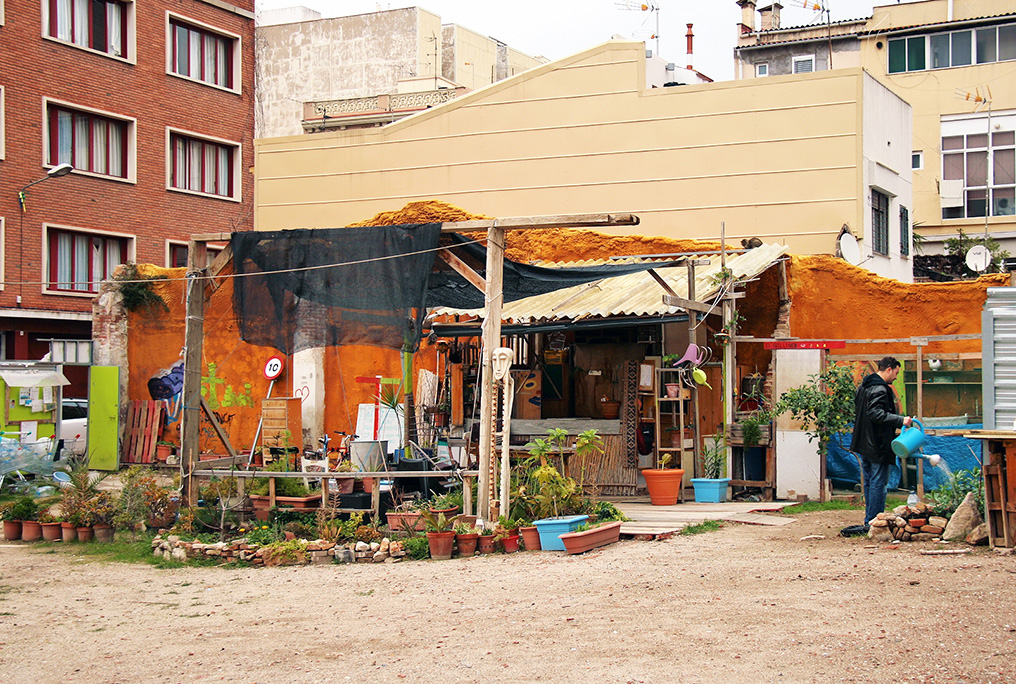Before end of year, our students spent some time with guest professor Hug March to study the Political Ecology of Urban Transformation, with a special focus on how power relations influence environmental change, the urban metabolism and the production of nature. The “politization” of environmental issues shows that the production and reconfiguration of the environment has a differential impact upon the population along with class, gender race or wider geopolitical dimensions. Therefore, there is a need for a critical examination of the production of green urban spaces or concepts such as the Smart City, and urban development and management both in the Global North and the Global South.
During the workshop, Hug March and our students also reflected on the potential and limits of grassroots-led urban transformation and the production of more emancipatory, democratic and egalitarian urban environments based on the example of urban gardening. “Urban gardens in Spain have been traditionally considered precarious and seen as informal activities at the periphery of the cities to be eradicated,” explains Hug March. “But recently, there has been a boom of urban gardens in some Spanish cities, being Barcelona one of the most prolific examples of this resurgence.” In Barcelona, a city with a deficit of green spaces compared to most European cities, urban gardens in the form of political and radical gardening have emerged since 2008, and in particular after the Indignados movement in 2011. Next to this important role of urban gardening in crisis and post-crisis cities, we can also observe a surge in high-tech urban agriculture, urban gardening as part of corporate strategies and entrepreneurial activities, highlighting the diverse meanings, forms and competing visions of urban gardening – from food production, leisure, educational purposes, community building to political activity. Hug March and his colleague Laura Calvet-Mir realised a demand for a critical examination of the meanings and politics of urban gardening in the 21st century, and undertook their study of Crisis and post-crisis urban gardening initiatives from a Southern European perspective: The case of Barcelona. The objective of their research was to describe social and public initiatives for the creation of urban gardens in Barcelona, and assess the motivations and the politics articulated in the various initiatives.
 The study included the three most prominent urban gardening initiatives in the city of Barcelona (including 54 gardens at the end of 2016): the Network of Municipal Gardens (municipally led gardens for retired people) highlighted through the example Masia Can Cadena; the Network of Communitarian Gardens (social movements) including the Huerto Indignado in Poblenou; and the Empty Plots Plan (social entrepreneurial urban gardening) with the example of ConnectHORT. As they state in their research, “comparable to the results of a study in allotment gardens in Belfast and Dublin (Corcoran and Kettle, 2015), the allotment gardens within the Network of Municipal Gardens of Barcelona may act as a ‘space of potential’, becoming spaces of knowledge co-production and intergenerational knowledge exchange. Likewise, they are places where relations of solidarity, mutuality and trust are being developed, providing the basis for renewed social cohesion.” Furthermore, they concluded: “Our results show that urban gardens within the city are an expression of different and non-exclusive meanings that explicitly or implicitly, in a context of crisis and post-crisis, mobilize notions of political gardening.”
The study included the three most prominent urban gardening initiatives in the city of Barcelona (including 54 gardens at the end of 2016): the Network of Municipal Gardens (municipally led gardens for retired people) highlighted through the example Masia Can Cadena; the Network of Communitarian Gardens (social movements) including the Huerto Indignado in Poblenou; and the Empty Plots Plan (social entrepreneurial urban gardening) with the example of ConnectHORT. As they state in their research, “comparable to the results of a study in allotment gardens in Belfast and Dublin (Corcoran and Kettle, 2015), the allotment gardens within the Network of Municipal Gardens of Barcelona may act as a ‘space of potential’, becoming spaces of knowledge co-production and intergenerational knowledge exchange. Likewise, they are places where relations of solidarity, mutuality and trust are being developed, providing the basis for renewed social cohesion.” Furthermore, they concluded: “Our results show that urban gardens within the city are an expression of different and non-exclusive meanings that explicitly or implicitly, in a context of crisis and post-crisis, mobilize notions of political gardening.”
If you would like to read some more about this topic, here are some readings Hug March gave to our students:
Or watch this TED talk of Ron Finley, guerrilla gardener in South Central LA:
This week we will continue with “An Introduction to Environmental Justice” with our guest professor Isabelle Anguelovski. For more information about her workshop, read our recent blog post.
Images:Huerto Indignado – Community garden in Poblenou, Jorge Franganillo, Creative Commons Licensed


